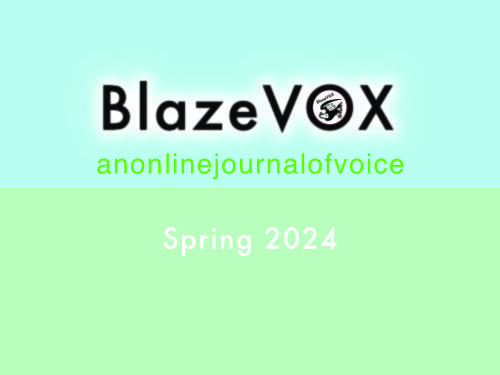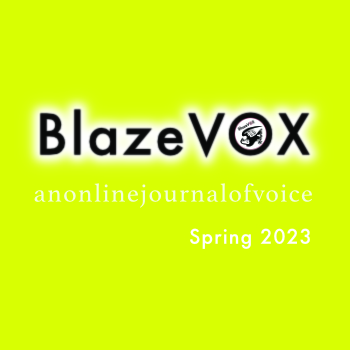IntroductionIntroduction
 Hello, and welcome to the Fall issue of BlazeVOX 19. Presenting excellent works of poetry, fiction, text art, visual poetry, and arresting works of creative non-fiction written by authors from around the world. Do have a look through the links below or browse through the whole issue in our Scribd embedded PDF, which you can download for free and take it with you anywhere on any device. Hurray!
Hello, and welcome to the Fall issue of BlazeVOX 19. Presenting excellent works of poetry, fiction, text art, visual poetry, and arresting works of creative non-fiction written by authors from around the world. Do have a look through the links below or browse through the whole issue in our Scribd embedded PDF, which you can download for free and take it with you anywhere on any device. Hurray!
In this issue, we seek to avoid answers but rather to ask questions. With a subtle minimalistic approach, this issue of BlazeVOX focuses on the idea of ‘public space’ and more specifically on spaces where anyone can do anything at any given moment: the non-private space, the non-privately owned space, space that is economically uninteresting. The works collected feature coincidental, accidental, and unexpected connections, which make it possible to revise literary history and, even better, to complement it.
Combining unrelated aspects lead to surprising analogies these pieces appear as dreamlike images in which fiction and reality meet, well-known tropes merge, meanings shift, past and present fuse. Time and memory always play a key role. In a search for new methods to ‘read the city,’ the texts reference post-colonial theory as well as the avant-garde or the post-modern and the left-wing democratic movement as a form of resistance against the logic of the capitalist market system.
Many of the works are about contact with architecture and essential living elements. Energy (heat, light, water), space, and landscape are examined in less obvious ways and sometimes developed in absurd ways. By creating situations and breaking the passivity of the spectator, to develop forms that do not follow logical criteria but are based only on subjective associations and formal parallels, which incite the viewer to make new personal associations. These pieces demonstrate how life extends beyond its own individual limits and often tells a story about the effects of global cultural interaction over the latter half of the twentieth century. It challenges the binaries we continually reconstruct between Self and Other, between our own ‘cannibal’ and ‘civilized’ selves. Enjoy!
Rockets! Geoffrey Gatza, editor
Cris Mazza — One Night, Two Perspectives, Three Screwdrivers
Harlan Yarbrough — Vignette in Blue
Benjamin Joe — Two Stories
Charles Holdefer — Here Lies a Myriad
S.W. Campbell — Spirit Week
Margaret Adams Birth — Halloween at the Donut Hut
Avery Strife — I Smell Potatoes
Pascale Potvin — An Involuntary Consequence
Nick LaRocca — Letters
hiromi suzuki — Darjeeling Daisy
Janis Butler Holm — Two Holiday Parodies
Gwen Dearing — Entertaining People
Roger Delgado — Plave Inlapiting
Elliott Griffin — Seven Poems
Gregg Williard — Now My Number is Water
BlazeVOX19 – Fall 2019 by BlazeVOX [books] on Scribd
New & Forthcoming from BlazeVOX books
Sauvage: Essays on Anglophone Poetry by Richard Owens
Broad in scale and scope, this volume attends to developments on the terrain of contemporary Anglophone poetry deeply articulated with issues of balance, justice, measure, and distance as these variously cohere, come apart and recombine across the unfolding present. Decentered and transatlantic in orientation, the essays aggregated in this volume emerge from a variety of social contexts, including the popular and the scholarly, print and digital forums, the cosmopolitan and the local, the center and the margin.
From Delaware Memoranda (2008) through Dead in the House of Pound (2018), this volume brings together a broad constellation of poetic work, much of which first appeared through presses on both sides of the Atlantic in editions either out-of-print or distantly circulated. In drawing this work together, the contiguous interests—formal and otherwise—that have compelled this labor are rendered sharper, more legible, and more readily apparent despite the passage of this work from earlier appearances in other social and intellectual contexts.
Boombox Serenade by Joey Nicoletti
Boombox Serenade is a playlist for middle age, Gen X edginess softening into domestic routines. But rather than lament that domesticity, the poems celebrate it, praising the comforts of marriage, family, pop culture, and food. Amid shouts-out to R.E.M. and The Cure, baseball and comic books, Nicoletti’s poems sharply observe and rejoice at small moments, from “auditioning” a raft of pies for Thanksgiving dinner, to bittersweet recollections of family members who’ve passed on. In the title poem, the speaker lists the songs to be played at his funeral and the friends to whom they’re dedicated; the resulting poem, and the collection as a whole, is a catalog of love and human connection, a “playlist of gratitude.” —Juliana Gray, author of Honeymoon Palsy and Roleplay
Going Head To Head by Wade Stevenson
Freewheeling and rooted, prophetic and playful, madcap and sincere in the rich tradition of Vicente Huidobro’s Altazor, Wade Stevenson’s Going Head to Head is a rare, refreshing collection. It’s widely allusive and wildly (in)formal, moving in and out of rhyme schemes freely, filling the ancient long-poem form with SpaceX rockets and AI nightmares, all while dancing between the sacred and the profane with such gusto that soon it’s delightfully hard to tell the difference. Going along for this ride is a true pleasure.
— J.G. McClure, author of The Fire Lit & Nearing
Occasion Poems by Diane Christian
Occasion poems were suggested by colleague, friend, and poet Robert Creeley, who thought it would be a good idea to have poems for various occasions made up as ink stamps, ready to imprint on a postcard and send off for occasions. Unlike occasional poems tied to specific persons and events, they have a broader human reach.
Between gilgul and galgal, logos and gematria, Irene Koronos’ fourth volume of the Grammaton Series, holyrit delivers a spectacular juxtapoiesis of textual and sonic probes— fragrant ellipses, fragments and eclipse, where all that is sacred, secular, savage and ex-static explode as sparks of light reminding us how the letters themselves are the building blocks of creation. And if “mysticism” is that which does not fit into the system; that which cannot be absorbed, holyrit presents itself as a “mystical” act, performed through exile and fluidity and virtuosic fluxuriance. —Adeena Karasick
The Reincarnation of Anna Phylactic (Volume III: The Posthuman Series) by Daniel Y. Harris
At once timestamped and timeless, Daniel Y. Harris collapses technology and theology into a dense Trojan horse / Trojan virus of a poem. By siphoning the modernisms of Arno Schmidt, Maurice Roche, and James Joyce through the digital, Harris exquisitely extends the discourse of endless textuality into the twenty-first century. Astonishingly original and shockingly new, lovers of experimental literature will celebrate this monumental achievement. —Kenneth Goldsmith
Cris Mazza is a master at depicting the ways the past haunts us. In YET TO COME, Cal’s half-life of regret poignantly and at times painfully reminds us of the agency in our own lives, even in the face of closed doors. Never one to reduce complex human beings to stereotypes, Mazza also reveals here the way intimacy complicates gender dynamics beyond the easy ways we so often see portrayed in the media. —Rob Roberge, author of More Than They Could Chew, and Drive
In My ID Bill Lavender engages and deconstructs the confessional as political act, religious gesture and literary subgenre, all three dovetailing into the Foucault-Derrida-esque essay-poem “La Police.” The overall effect is symphonic—each poem gradually builds toward the epic ruminations of “Tui: An Elegy” before leveling off at the philosophical meditations “Of Dreaming” and “Of Sighing.” My ID is, in the end, a memoir in verse: elegant, wise and enthralling. —Tyrone Williams, author of As Iz
Everything Seems Significant by Jan Bottiglieri
“For fans of Blade Runner, this poetry is a journey deep into the mind, heart, and soul of a classic, neo-noir, science fiction saga. The images flash, and shuffle, creating hiraeth—nostalgia and longing for a place we can never visit, which may never have existed. Powerful poetry; intimate moments.” —Richard Thomas, author of Disintegration and Breaker (Thriller Award nominee)
Ghosts of the Upper Floor | The Complete Dark Shadows (of My Childhood), Book 3 by Tony Trigilio
There’s so much to admire in Tony Trigilio’s addictive new book (the third in his delicious Dark Shadows poetry soap opera): the obsessive vision, the light and dark of emotion, and the everyday world brushing eerily—sometimes hilariously—against the supernatural. Only a book so beautifully self-aware could wrench poetry from disastrous lines like: “experience a painful and hideous transformation from man to predatory animal.” Inside these love poems to baroque camp and fabulous melodrama is a haunting meditation on memory and the shadowy lenses through which we look back on the past while navigating the present. Trigilio shows us there’s nothing so small or obscure, or so wonderfully bad, that we can’t love it—in its entirety—into art. —Aaron Smith
Iterations of Lilith and Adam: An Alien’s Memoir by Chuck Richardson
Chuck Richardson writes like he’s the conductor of a chorus of demons. Hallucinatory and searing, Iterations of Lilith and Adam pounds away at your equilibrium until your only choice is to let go, accept your fate, and let Richardson be your guide. I tore through this book and my only disappointment occurred when the music stopped when I had read the last word. Take a chance on a book that is original in both thought and structure and you’ll be rewarded with an experience you likely won’t soon forget. —Dave Megenhardt, author of Dogs in the Cathedral and North of Portsmouth
Ante-Animots: Idioms and Tales by Nicholas Alexander Hayes
Nicholas Hayes writes intuitive poetry, and is, in a rather Dickinsonian manner, keen to define and re-define things, including certain behaviour patterns of humans and animals alike. I see this collection as a “reversed” Manual de zoología fantástica by Borges, in the sense that, instead of describing imaginary beings, Hayes gives a hallucinatory account of some familiar creatures playing out their very own grotesque. – Anatoly Kudryavitsky, author of The Flying Dutchman
Selected from more than four decades of journal keeping, and with additional excerpts from published essays, Analects speaks to the general reader, and specifically to those who have interests in poetry and poetics. The reader will not come away without encountering helpful insights and disclosures about writing and literature in this collection. Gessner’s prose has been described as “Structurally ingenious,” (Jonathan Galassi, Farrar, Straus & Giroux,” and “A great talent,” (Ray Powers, Scott & Field).
In DRINK ME, Mary Kasimor begins with a beating heart, slash acting as pulse, and she briskly moves into the sensual aggregate that is being alive. In her intense, inventive view, “the genius/of dirt are flowers,” “money is god” and “god is enormous.” But the visceral, corporeal existence of earthbound mortals is paired with something celestial: the deep sky, planets and stars appear again and again for perspective, like mirrors, which also appear again and again, casting back a vast range of experiences. Even with her fixed and fearless gaze upon the worst, most terrifying work of being human, marbled throughout is what is the best: the struggle to make sense, make meaning, make beauty. To enter this book is to enter a wonderland of magic and mirrors. —Carolyn Guinzio



Comments (0)